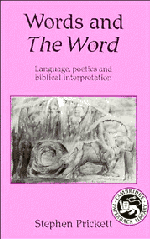2 - ‘The peculiar language of heaven …’
Published online by Cambridge University Press: 01 March 2011
Summary
The religious and the poetic
If the twentieth century has become increasingly uneasy and hesitant in dealing with the status of biblical narrative, it has seen a corresponding efflorescence of theories and studies of religious language. I say ‘corresponding’ because it might seem reasonable to suppose that the growth of the latter was in some way stimulated by the problems presented by the former. Though this may be the case, it is nevertheless observable that the ‘answers’ so produced tend to be curiously tangential to the original ‘questions’ – as if the problems never quite permit themselves to be resolved into the terms implied by the suggested solutions. One is left with that uneasy feeling sometimes encountered when an apparently impressive argument has left some vital factor out of account, or contains a nagging contradiction that temporarily eludes analysis, but would be obvious if once pointed out. It is even, perhaps, analogous to the state of mediaeval cosmology just before Copernicus, desperately trying to ‘save the appearances’ by more and more elaborate epicycles, or that of biology immediately pre-Darwin. The tangled relationship between the ‘religious’ and the ‘poetic’ seems to be a case in point.
The concept of ‘religious language’ is a significantly recent one. The notion that the actual words used to talk about religious experience should be seen as constituting a historical or epistemological problem of a special or even unique kind is rather less than three hundred years old.
- Type
- Chapter
- Information
- Words and The WordLanguage, Poetics and Biblical Interpretation, pp. 37 - 94Publisher: Cambridge University PressPrint publication year: 1986



